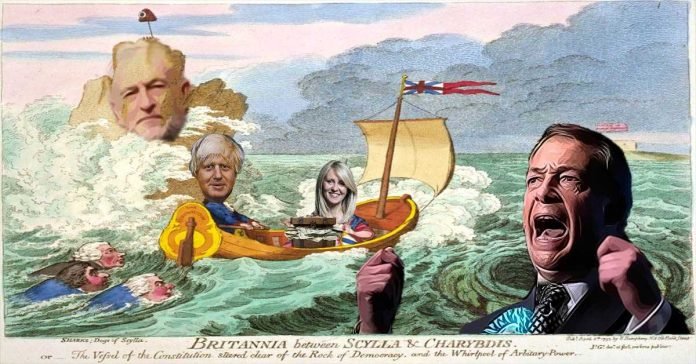
‘I truly believe only I can steer the country between the Scylla and Charybdis of Corbyn and Farage and onto calmer water.’
Boris Johnson, the frontrunner to be next British prime minister, said he wouldn’t hand over the £39 billion Brexit bill to Brussels until he got a better deal.
The former foreign secretary told the Sunday Times about his Brexit plans, which include: Holding on to the Brexit divorce payment until Brussels agrees more favourable terms; scrapping the Northern Ireland backstop; changing the Brexit negotiating team so that Cabinet ministers are in charge; guaranteeing the rights of the 3.2 million EU citizens living in the U.K.; and stepping up preparations for a no-deal Brexit.
On the Brexit payment, he said: “I think our friends and partners need to understand that the money is going to be retained until such time as we have greater clarity about the way forward. I always thought it was extraordinary that we should agree to write that entire cheque before having a final deal. In getting a good deal, money is a great solvent and a great lubricant.”
Johnson also said that the only way for the Conservative Party to see off the challenges posed by the Labour and Brexit parties was to leave the EU on October 31.
He used the names of sea monsters from Greek mythology to make his point, saying:
“I truly believe only I can steer the country between the Scylla and Charybdis of [Jeremy] Corbyn and [Nigel] Farage and onto calmer water.
This can only be achieved by delivering Brexit as promised on October 31 and delivering a One Nation Tory agenda.”
Between Scylla and Charybdis
Cultural and popular references. The myth was given an allegorical interpretation by the French poet Barthélemy Aneau in his emblem book Picta Poesis (1552). There one is advised to choose the risk of being envied for wealth or reputation rather than swallowed by the Charybdis of poverty. “Choose the lesser of these evils. A wise man would rather be envied than miserable.
The story was often applied to political situations at a later date. In James Gillray‘s cartoon, Britannia between Scylla and Charybdis (3 June 1793), ‘William Pitt helms the ship Constitution, containing an alarmed Britannia, between the rock of democracy (with the liberty cap on its summit) and the whirlpool of arbitrary power (in the shape of an inverted crown), to the distant haven of liberty’.
This was in the context of the effect of the French Revolution on politics in Britain. That the dilemma had still to be resolved in the aftermath of the revolution is suggested by Percy Bysshe Shelley‘s returning to the idiom in his 1820 essay A Defence of Poetry: “The rich have become richer, and the poor have become poorer; and the vessel of the state is driven between the Scylla and Charybdis of anarchy and despotism.
French President Emmanuel Macron has warned ominously that Boris Johnson’s threat to withhold the UK’s £39bn ‘divorce bill’ payment from the EU could be treated like a sovereign debt default.
Nations which do not repay money they have borrowed – those which default on their sovereign debt – are punished by international markets.
A debt default leads to devaluation of the currency, an increase in the price of servicing national debt, and a lower national credit score – although it is unknown whether the international financial markets would respond in line with historical precedent in this case.
Must we pay the divorce bill?
March 2017 a report by the EU Financial Affairs Lords sub-committee, which concluded “if agreement [between the UK and the EU on withdrawal] is not reached, all EU law—including provisions concerning ongoing financial contributions and machinery for adjudication—will cease to apply, and the UK would be subject to no enforceable obligation to make any financial contribution at all”.
On the surface, it suggests the UK is not legally bound to make any payments if it leaves the EU without a deal.
Support Independent Journalism Today
Our unwavering dedication is to provide you with unbiased news, diverse perspectives, and insightful opinions. We're on a mission to ensure that those in positions of power are held accountable for their actions, but we can't do it alone. Labour Heartlands is primarily funded by me, Paul Knaggs, and by the generous contributions of readers like you. Your donations keep us going and help us uphold the principles of independent journalism. Join us in our quest for truth, transparency, and accountability – donate today and be a part of our mission!
Like everyone else, we're facing challenges, and we need your help to stay online and continue providing crucial journalism. Every contribution, no matter how small, goes a long way in helping us thrive. By becoming one of our donors, you become a vital part of our mission to uncover the truth and uphold the values of democracy.
While we maintain our independence from political affiliations, we stand united against corruption, injustice, and the erosion of free speech, truth, and democracy. We believe in the power of accurate information in a democracy, and we consider facts non-negotiable.
Your support, no matter the amount, can make a significant impact. Together, we can make a difference and continue our journey toward a more informed and just society.
Thank you for supporting Labour Heartlands








